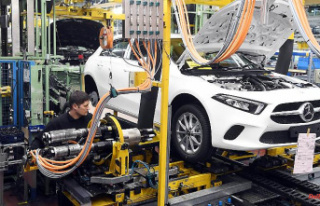Delivery bottlenecks, price increases and staff shortages are making things difficult for the handicraft sector. Customers also suffer as a result: the average waiting time for craftsmen is eleven weeks, on construction sites it is four months. "These are record values," warns the trade association.
Customers currently have to wait an average of eleven weeks for a craftsman, and around four months for a builder. "These are record values," said Holger Schwannecke, Secretary General of the Central Association of German Crafts, in Munich. "Customers have to wait a long time." Waiting times are also unlikely to decrease: the industry is struggling with delivery bottlenecks, enormous price increases and a shortage of skilled workers - all at once. The Internationale Handwerksmesse, at which Federal Chancellor Olaf Scholz wants to meet the central associations of the German economy on July 8, is marked by the crisis.
Even in construction, which was previously a stable economic anchor, the situation has worsened dramatically, said Schwannecke. "Work is coming to a standstill on many construction sites, there is a lack of spare parts in car workshops, and there is a lack of raw materials and preliminary products at the industrial suppliers to the trades." Because price increases cannot be passed on to customers everywhere, previously calculated offers are now often a loss-making business for companies.
In residential construction there are price increases of around 20 percent, said the Bavarian crafts president Franz Xaver Peteranderl. In some municipalities, a quarter of the building applications will be withdrawn. "The first housing construction companies are already warning of an abrupt end to the construction boom in the coming year."
According to the Central Association, the handicraft businesses lack around 250,000 skilled workers. This bottleneck, also caused "by a wrong education policy", endangers economic growth and could "become a brake on transformation for our entire country," said Schwannecke. A master craftsman earns no less in his working life than an academic, said Peteranderl - and in the trades you can "actively help shape the energy transition instead of just debating it".
The skilled trades include around one million companies with 5.5 million self-employed and employees and around 360,000 apprentices. Around 1,000 exhibitors from 60 trades are expected to attend the Internationale Handwerksmesse, which will take place for the first time in the summer from July 6th to 10th after two years of a corona-related break.












